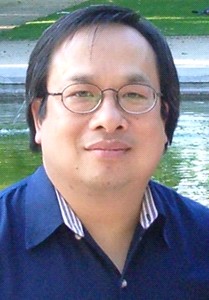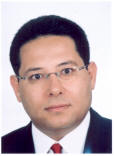|
:: Key Notes |
|
By Prof. Dr. Phuoc TRAN-GIA,
University of Wuerzburg , Germany
|
Abstract
Currently, we are witnessing fast-moving activities towards next generation network. On the one hand, a transition from multi-service networks to multi-network services can be observed, together with the move of the service creation process and content location to the edge of the network. Unlike classical services, which are designed and deployed by network providers, edge-based services are created by the users, where numbers of users rapidly increase, force the network to react (Skype, Youtube, Myspace,…) and emerge to business-cases. Contents of such content delivery platforms are rather created by the user than offered by the network provider. These issues have to be properly considered in the design of Next Generation Internet. The talk will address the issues of interaction between network design and service evolution, which emerge to the concept of Quality of Experience, opening a fast-growing research field. The talk will also highlight research initiative in the US , in Europe as well as in Asia towards Future Internet.
. |
About speaker |

Phuoc Tran-Gia is professor and director of the Institute of Computer Science , and currently Dean of the Faculty of Mathematics and Computer Science, the University of Wuerzburg , Germany . He is also Chairman of the Advisory Board of Infosim. Previously he was at academia in Stuttgart , Siegen ( Germany ) as well as industries at Alcatel (software development System 12), IBM Zurich Research Laboratory ( Zurich , Switzerland , architecture and performance evaluation of communication networks).
Professor Tran-Gia was chairperson of the management committee of the COST 257 action of the European Union entitled "Impact of new services on the performance and architecture of broadband networks". He is also founding director of the multi-university Nortel's " Center of Network Optimization ". He is consultant and cooperation project leader with Siemens ( Munich , Berlin ), Nortel ( Texas ), T-Mobile International ( Bonn ), France Telecom ( Belfort ), Bosch ( Stuttgart ).
Prof. Tran-Gia published 2 books and around 100 papers in international journals, seminars and workshops. His current research areas include architecture and performance analysis of communication systems, and planning and optimization of communication networks.
Phuoc Tran-Gia is also founder Infosim ( Würzburg , Germany ) and Codirector of Infosim Asia Pacific ( Singapore ), which is specialized in IP network management products and services. He currently works with the European Union authorities and the German Ministry of Research and Education on funding strategies and initiatives towards Next Generation Internet.
|
Advances in Broadband Access Communications |
By Prof.
Tho Le-Ngoc,
Department of Electrical and Computer Engineering of McGill University, Canada
|
Abstract
Broadband access communications have been continuously developed with many advances in response to increasing demands of multimedia services and applications. Broadband communications systems are generally power- and bandwidth-limited while the communications channels are characterized by their frequency-selective fading and the presence of noise and interference. Due to the dynamic nature of both transmission media and multimedia traffic, re-configurable and adaptive schemes are of particular interest. Furthermore, in most broadband communications systems, interference is the major performance-limiting factor and interference mitigation can be more efficiently done by coordination of the transmission and resource allocation between users to minimize mutual interference in a collaborative manner. The talk will provide an overview of new developments/deployments in broadband access communications, and highlight technical issues in dynamic resource allocation and intelligent multi-dimensional signal processing and the evolution from competition, to cooperation and cognition in communications.
. |
About speaker |

Tho Le-Ngoc obtained his B.Eng. (with Distinction) in Electrical Engineering in 1976, his M.Eng. in Microprocessor Applications in 1978 from McGill University, Montreal, and his Ph.D. in Digital Communications 1983 from the University of Ottawa, Canada.
During 1977-1982, he was with Spar Aerospace Limited as a Design Engineer and then a Senior Design Engineer, involved in the development and design of the microprocessor-based controller of Canadarm (of the Space Shuttle), and SCPC/FM, SCPC/PSK, TDMA satellite communications systems.
During 1982-1985, he was an Engineering Manager of the Radio Group in the Department of Development Engineering of SRTelecom Inc., developed the new point-to-multipoint DA-TDMA/TDM Subscriber Radio System SR500. He was the System Architect of this first digital point-to-multipoint wireless TDMA system.
During 1985-2000, he was a Professor in the Department of Electrical and Computer Engineering of Concordia University.
Since 2000, he has been a Professor in the Department of Electrical and Computer Engineering of McGill University.
His research interest is in the area of broadband digital communications.
Since 2004, he has been Scientific Director of the Center for Advanced Systems and Technologies in Communications (SYTACom), including 5 universities in Quebec.
He is a Senior Member of the Ordre des Ingénieur du Quebec, a Fellow of the Institute of Electrical and Electronics Engineers (IEEE), a Fellow of the Engineering Institute of Canada (EIC), and a Fellow of the Canadian Academy of Engineering (CAE).
He is the recipient of the 2004 Canadian Award in Telecommunications Research, and recipient of the IEEE Canada Fessenden Award 2005.
He holds a Canada Research Chair (Tier I) on Broadband Access Communications, and a Bell Canada/NSERC Industrial Research Chair on Performance & Resource Management In Broadband xDSL Access Networks.
Since 1985, he has been a consultant, Technical Advisor, Chief Architect, Chief Scientist to several companies in communications.
|
Ubiquitous Communications: The Next Wireless
Frontier |
Khaled Ben
Letaief
Chair Professor and Head, Electronic and Computer
Eng. Department
Director, Hong Kong Telecom Institute of Information
Technology
The Hong Kong University of Science and Technology
Email:
eekhaled@ece.ust.hk . Internet:
http://www.ece.ust.hk/~eekhaled |
Abstract
Over the past
decade, wireless communications has seen an
exponential growth and will certainly continue
to witness spectacular developments due to the
emergence of new interactive multimedia
applications and highly integrated systems
driven by the rapid growth in information
services and microelectronic devices. So far,
most of the current mobile systems are mainly
targeted to voice communications with low
transmission rates. In the near future,
however, broadband data access at high
transmission rates will be needed to provide
users packet-based connectivity to a plethora of
services. It is also almost certain that the
neXt Generation (XG) wireless systems will
consist of complementary systems with a set of
different standards and technologies along with
different requirements and complementary
capabilities that will offer users ubiquitous
wireless connectivity between mobile and desktop
computers, machines, game systems, cellular
phones, consumer electronic products, and other
hand-held devices. A key requirement in future
wireless systems is their ability to provide
broadband connectivity with end-to-end Quality
of Service (QoS), a high network capacity, and
throughput at a low cost.
This talk will
present an overview of the most recent trends along
with the evolution of cellular systems to 4G and the
emergence of long range Wider-Fi networks such as
WiMAX. It will also describe and discuss the
challenges facing the XG broadband systems with a
special interest on cognitive ubiquitous
communications networks, dynamic resource
allocation, especially for MIMO and OFDM along with
cross-layer design and optimization. |
About speaker |
 Professor Letaief
received the Ph.D. Degrees in Electrical Engineering
from Purdue University, USA in 1990. From 1990 to
1993, he was a faculty member at the University of
Melbourne, Australia. Since 1993, he has been with
HKUST where he is a Chair Professor and Head of the
Electronic and Computer Engineering Department. Professor Letaief
received the Ph.D. Degrees in Electrical Engineering
from Purdue University, USA in 1990. From 1990 to
1993, he was a faculty member at the University of
Melbourne, Australia. Since 1993, he has been with
HKUST where he is a Chair Professor and Head of the
Electronic and Computer Engineering Department.
Dr. Letaief is an
acknowledged authority in the area of wireless and
mobile communications. He served as consultants for
different organizations and he is the founding
Editor-in-Chief of the prestigious IEEE Transactions
on Wireless Communications. He also served on the
editorial board of other journals including the IEEE
Journal on Selected Areas in Communications-Wireless
Series (as Editor-in-Chief). Professor Letaief has
been involved in organizing a number of major
international conferences and events, including the
General Co-Chair of the 2007 IEEE Wireless
Communications and Networking Conference, WCNC’07;
as well as the Technical Program Co-Chair of the
2008 IEEE International Conference on Communication,
ICC’08. He also served as the Chair of the IEEE
Technical Committee on Personal Communications.
In addition to his
active research activities, Professor Letaief has
also been a dedicated teacher committed to
excellence in teaching and scholarship. He received
the Mangoon Teaching Award from Purdue University in
1990; the Teaching Excellence Appreciation Award by
the School of Engineering at HKUST (4 times); and
the Michael G. Gale Medal for Distinguished Teaching
(Highest university-wide teaching award).
He is a Fellow of
IEEE, an elected member of the IEEE Communications
Society Board of Governors, and an IEEE
Distinguished lecturer. He is also the recipient of
the 2007 IEEE Communications Society Publications
Exemplary Service Award |
|
Keith Hong -
Technical marketing manager at QUALCOMM Incorporated |
Abstract
Global demand for
mobile broadband is growing significantly and
continues to outpace availability. Strong, sustained
consumer demand for mobile voice services has
created an enormously successful global ecosystem,
with numerous operators providing services and
vendors delivering products. With significant scale
and maturity, the 3G industry is well-positioned to
deliver mobile broadband to an enormous installed
base of customers, while reaching out to new ones.
3G’s growing scale is leading to more-affordable,
more-capable devices across all market segments.
This fact, in conjunction with growing global
coverage, increases the likelihood that 3G devices
will maintain an advantage over other technologies.
The versatility of 3G systems to support all
IP-based applications with robust QoS is enabling
operators to bring to market a wide range of
creative VoIP and data services. While 3G systems
give the best mobile broadband experience today, it
is also likely that they will continue to do so as
their evolutions introduce class-leading MIMO &
advanced receivers solutions. The talk will give an
overview of the 3G roadmap, its evolution path &
features, and its services & applications. It will
highlight the fact that 3G is, and will continue to
be the best mobile broadband technology. |
About speaker |
Keith Hong is a technical marketing manager at
QUALCOMM Incorporated. Keith’s primary
responsibility is to support 3G-related technical
marketing & engineering activities in Southeast
Asia.
Keith has worked in the telecommunications industry
for more than 10 years and has gained extensive
experience in a wide spectrum of companies across
the value chain. He started his career as a telecom
application programmer, then spent five years
working for mobile carriers, managing their mobile
applications & services businesses. Following this,
Keith worked as a product manager at Ericsson and
helped the company to promote 3G application
platforms & service networks to carriers in
HK/Macau.
Keith earned a bachelor degree in computer science
and a master degree in business administration, both
from Hong Kong University of Science and Technology. |
| |
|
|
|
Copyright © 2006, HUT-ICCE Annual International Conference on Communications and Electronics
Powered by TMTSys 2.0
|
|
|

